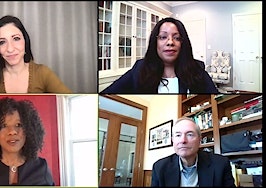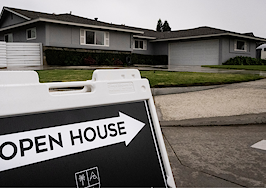The housing market will enter 2021 blazing hot with off-the-charts demand and an extreme shortage of homes for sale. While the risk of a double-dip recession hovers in the background, home sales and prices are expected to keep rising next year as coronavirus vaccines become available, the economy starts buzzing again and a new president focused on housing takes the helm. Inventory will continue to rule.
That’s according to several economists Inman reached out to for their predictions on how the housing market would fare in 2021. They weighed in on home sales and prices, inventory, the impact of a coronavirus vaccine, the incoming Biden presidency and the risk of another recession.
On home prices and sales
“We’re going to start the year in a super hot market,” said Mike Simonsen, CEO of housing market analytics firm Altos Research, in a webinar last week called “The Real Estate Market Outlook for 2021.”
Inventory has plunged to just under 469,000 single-family homes this month, down some 40 percent compared to the same time last year, according to Altos’ data.

Source: Altos Research
While about 31 percent of listings have gotten price reductions at the end of the year in previous years, current price reductions only stand at 26 percent, according Simonsen. “That’s because demand has been off the charts,” he said. “[For] houses on the market now, if they take a price cut, that means the demands is a little weaker, and the price that it’s going to sell at in January or February, it’s going to be lower.
He added that prices are “going to keep falling now through February, as the fresh new inventory comes on, and then we’ll probably have a resumption of a more normal market in the second quarter of 2021.”

Danielle Hale
Danielle Hale, chief economist at realtor.com, expects home sales to continue growing, jumping 7 percent in 2021, and prices to continue rising to new highs, though at a slower pace than in 2020, increasing 5.7 percent.
“As far as seasonality goes, we expect housing to be busier in spring, like it normally is, and while fall will be strong, we don’t expect it to match 2020’s frenzied level of activity,” she told Inman via email.
Daryl Fairweather, chief economist for Redfin, also predicted a strong year for home sales in 2021, even stronger than 2020 has been. She anticipates low double-digit home sale growth, close to 10 percent.
“There a lot of people who may have wanted to move this year but were just too nervous,” she told Inman in a phone interview. “They didn’t want to lose their homes during a pandemic or they didn’t want to list during uncertain economic times. It seems like next year the economy will be in a better place than it was this year.
“With the vaccine on the horizon we may even be able to open the economy, so that will lead to a lot more economic confidence among homebuyers and more people will just be willing to enter into homeownership with the recovery, though we’ll probably also see slightly higher interest rates. Interest rates have been at record lows this year, and they will probably take off a bit in 2021. That will make homebuying slightly less affordable, so we may see slower price growth in homes, just because of higher interest rates.”

Daryl Fairweather | Credit: Redfin
Fairweather said she thinks more people will move across the country next year as remote work becomes more normalized.
“They’re going to seek out places that are more affordable where they can have more space, and they’ll choose to live in places that meet their own personal preferences instead of just living where they can find a job,” she said.
She expects home prices to rise the most in the most affordable places in the country. “We’ve seen a lot of migration to places like Austin and Phoenix,” she said. “I think that there is this kind of spillover effect where Phoenix becomes expensive, and then people leave Phoenix for like Tucson or they leave Austin for San Antonio and prices there in turn rise.”
In a forecast released Tuesday, the Fannie Mae Economic and Strategic Group had more modest expectations, predicting a 2.8 percent rise in total home sales in 2021 after a 7.6 percent rise in 2020. The mortgage giant expects the median existing-home price to rise 4.1 percent next year, to $302,000.
“Even though near-term economic growth may be slowing, as made evident by the latest employment data, we believe the high probabilities of a successful COVID-19 vaccine distribution and additional federal stimulus will carry the economy through a relatively soft first half of 2021 before accelerating in the second half,” said Doug Duncan, Fannie Mae’s senior vice president and chief economist, in a statement.
“We also expect housing to remain strong, despite slowing from its previously torrid pace, as homebuilders catch up on current commitments and more existing homeowners list their homes to take advantage of strong price growth. We expect the mortgage market to finish 2020 at a historic level of production before slowing slightly but remaining strong in 2021.”
On inventory
The biggest factors that will drive the housing market in 2021 are the “age-old economic fundamentals of supply and demand,” Svenja Gudell, chief economist for Zillow Group, told Inman via email. That means sellers will likely continue to have the upper hand.
“The number of available homes will remain low, and demand for them will stay exceptionally high,” Gudell said. “This ongoing push/pull will ensure that home prices keep rising at an above-average pace, which will continue to cut both ways. For existing homeowners, there will be enormous opportunities to build and utilize equity, especially in a post-COVID economy in which we are very likely to see a surge in spending of all kinds.
“But for those struggling to enter the market, low mortgage interest rates offer little cover for home prices that have risen much faster than incomes over the past several years, and saving an adequate down payment won’t get any easier. I also think the traditional home shopping season will be more fluid as additional tools enable more sellers to reach more buyers, and vice versa, regardless of the time of year.”

Svenja Gudell
Gudell is hopeful that a vaccine will ease seller anxieties enough to pull them off the proverbial fence.
“Increased levels of new construction activity at the tail end of 2020 will carry over into at least the first few months of 2021, both of which will add some modest amount of new inventory,” she said.
“But I still expect inventory to remain relatively low. The market will continue to move quickly, but the ongoing adoption and refinement of tech tools like push notifications when homes hit the market, 3D tours and virtual closings will help consumers keep pace, shortening the home search and sale process from months, to weeks or days in many cases. This will mean continuing high velocity in the housing market and a higher number of transactions than we have seen in recent years.”
Gudell expects the rental market will “come back strongly” in a post-COVID world, when urban living regains its previous shine.
“[That’s] welcome news for struggling landlords, but little solace to younger Americans just starting out and saddled with high rent burdens,” she said. “Household formation has been historically weak for the past several years, but these millions of ‘missing’ households will continue to set out and seek homes of their own and are very likely to turn to the rental market as the traditional first step, reigniting rental demand.
“The math is unavoidable — there are millions of millennials aging into their prime homebuying years, and millions more Gen Zers behind them that all will want and need homes of their own, keeping demand at a boil for years to come.”
Redfin’s Fairweather is optimistic that 2021 be a “very strong year” for new construction, in part because low interest rates will make it cheaper to build homes and because a big pause in commercial building will mean that residential builders don’t have to compete for workers and materials. Fannie Mae predicts single-family housing starts will rise 12.8 percent to 1.1 million in 2021, from 981,000 in 2020. Still, it won’t be strong enough to overcome years of underproduction, according to Fairweather.
“I think new construction will have its best year since the last housing crash,” she said. “But … we’ve been in a decade-long slump of new construction. So one good year isn’t gonna get us out of the hole that we’re in. There will still be overall a shortage of homes. But you know, every little bit helps.”
She said the market is short about 2 million homes, so it would “take 10 years of basically doubling our production to get us even close,” she said. Realtor.com put the shortfall even higher, at nearly 4 million homes.
“I think if we really wanted to address the shortage of homes, there would have to be significant government intervention [and] subsidizing of new construction,”Fairweather added. “It’s not going to happen just from purely market-driven forces.”
Kosta Ligris, co-founder of digital mortgage platform Stavvy, anticipates that single-family homes will remain in demand in 2021.
“The comfort and perceived safety of being in a single family home with no common areas or exposure to unknown contacts and risk has never been more relevant,” he told Inman via email. “I am seeing single family homes in suburban areas do very well and expect this trend to continue well into the spring 2021 market.”
On the Biden presidency
Realtor.com’s Hale anticipates the Biden administration will likely focus its early efforts on keeping the coronavirus as contained as possible.
“Until vaccines are more widely available, this is one of the best ways to help the economy heal,” she said. “Additionally, if a deal is not reached before January, ensuring that another stimulus package is available to support individuals and businesses while economic activity continues to lag as the vaccines are being rolled out will be a top priority. Beyond that, Biden has an ambitious policy agenda, and the impact on the economy will depend on what the administration prioritizes.”
Fairweather noted that Biden has promised to invest $65 billion in building affordable homes, both rental and for-sale. “That’s a significant investment and will definitely help mitigate [home] price increases and rent increases,” she said.
But she’s not very confident that housing will be at the top of his already-packed agenda. “I’m not sure what he’s going to try to get to first, especially if he’s facing a split Congress, so we’ll see what he ends up actually prioritizing, if he puts housing at the top of the list,” she said.
Fairweather does believe that Biden’s administration will start tackling housing segregation right away, through executive orders.
“I know that he wants to reduce segregation,” she said. “He wants to fund the low-income housing tax credit program fully so that people who are low income can afford apartments in areas that are more affluent. So all that would work to reduce segregation.
“That gives people housing vouchers and they can go out and rent apartments wherever they choose. He also wants to fight discrimination against that program because some landlords don’t accept those housing vouchers. So if a low-income family could receive a voucher and could actually use it wherever they wanted to they could use it in an area with a high amount of opportunity, and that would go a long way to creating more equality across income and race.”
Biden also wants provide down-payment assistance for families to increase homeownership, but Fairweather warned that that would have to be coupled with an increased supply of affordable homes.
“Because if you just increase down-payment assistance, you’re going to have a lot more people competing for the same homes,” she said. “That will drive up prices. You have to do both at the same time for it to be successful.”
Double-dip recession?
In its 2021 forecast, realtor.com cautioned that a double-dip recession was still a possibility next year, in part because of an uneven recovery in the labor market.
“As the U.S. continues in a K-shape recovery, a gap is widening between those with and without jobs as well as industries recovering well versus those seeing continued lack of business,” the company said.
“In the short term, this could lead to less consumer spending which could more broadly impact businesses and economic growth. In the long term, this could impact the U.S. housing market as ‘would-be’ buyers disappear from the market, cooling demand and driving down home prices. The current question is how long the K-shape can diverge before the impact begins to cascade into the broader economy and other previously less-affected sectors such as housing.”
Altos’ Simonsen also said that the risk of a double-dip recession is real, particularly if the federal government fails to pass a new stimulus plan.
“If the stimulus doesn’t bail out the people who are impacted, the businesses that are impacted, that could deepen a recession,” he said. “That could very easily back off the demand and that would be a risk to the market.”
Still, he anticipates that even if demand pulls back because of a recession, that lower demand will still meet with “ultra tight inventory.” He doesn’t anticipate that foreclosures will spike because homeowners have record levels of equity in their homes, which means they will likely opt to sell, rather than let their homes go into foreclosure.
“Even if you weren’t able to make your mortgage payment this year, your home value climbed by 10 percent on average in this country, so your equity gained a ton,” he said.
“So in the spring, when we have to move out of the forbearance window, when people have to start paying their mortgage again, they are unlikely to go into foreclosure because they have a lot of equity. And because there’s so much demand, they can sell their house really quickly.”













